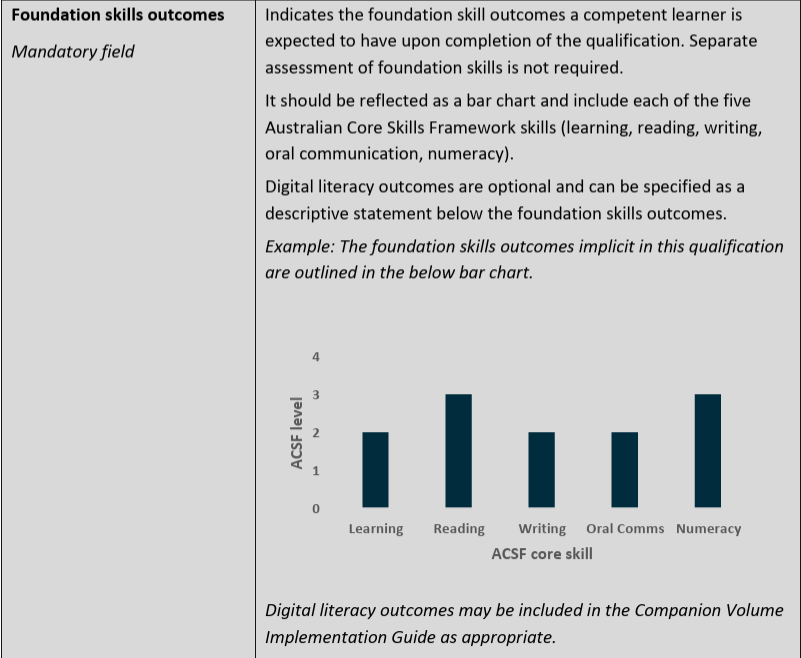Foundation Skills
Under the new Training Package Organising Framework from 1.7.25
On 1 July 2025, a new framework came into effect for how qualifications are designed for the Vocational Education and Training (VET) sector.
VET Qualification Reform has been a project over previous years and on 6 December 2024, Skills Ministers agreed to a new approach "guided by design principles" and meant to "improve quality, simplify course designs and reduce complexity."
Jobs and Skills Councils (JSCs), as industry-owned bodies, are responsible for the development of training package training products. And, as writers of the qualifications, skill sets, units of competency and accompanying Companion Volume Interpretation Guides, JSCs must use comprehensive workforce analysis, development of Job Profiles and mapping of career and education pathways to inform the content of the training package training products they produce.
Part of this is to identify what graduates must know and be able to achieve on successful completion of a qualification.
A new qualifications template is part of the updated 'Training Package Organising Framework (TPOF)'.
The TPOF is a set of rules owned by Skills Ministers that dictates the development standards and endorsement process for training package products.
The TPOF sets out the product and process requirements that must be complied with for all national training package products and is a compilation of three documents:
(c) Skills Education 2025
Of note, under the TPOF there is a new template for:
And, a choice of unit of competency template:
Under these new rules, the shift is to a "qualification-first approach" under which JSCs can opt to either describe job functions and tasks, or describe the knowledge and skills outcomes obtained from training.
To this end, qualifications will now identify foundation skills as an overall outcome of the qualification, rather than at the level specific to the unit of competency.
JSCs must determine industry needs when developing their training products and while it is no longer a requirement for them to articulate foundation skills at a unit level, they may still choose to do so, especially where a unit is primarily delivered as a 'stand-alone' unit. First Aid and Responsible Service of Alcohol are examples of common 'stand-alone' units.
Principle 4 of the Qualification Development Quality Principles states:
Foundation skills must be clearly identified and:
Standard 1.2 of the Standards for Training Packages states:
1.2 Training Packages – foundation skills
1.2.1 Foundation skills must be explicit and recognisable within the training package
1.2.2 Foundation skills in training packages must reflect, and not exceed, the foundation skills required in the workplace
1.2.3 Foundation skill requirements must be stated in the ‘Foundation Skills’ field in the qualification and/or Skill Set template. Where a specialisation stream, group of electives or a specific elective require a higher level of foundation skills, this must be explicitly stated (p.14 TPOF)
Per the new qualification template, JSCs are required to adhere to the following mandatory component (p.56 TPOF)
This is replicated in the new skill set template (p.61 TPOF)

In the Companion Volumes:
Under 'Implementation information', it states:
In the 'Application, Elements & Performance Criteria' and 'Application of Skills and Knowledge' unit templates:
Foundation skills may be included as an optional field:
Department of Employment and Workplace Relations (DEWR) have confirmed (emphasis added):
JSCs will need to identify exact requirements for the training product through their consultation activities and by drawing on the educational expertise of VET practitioners during the public consultation process." (- DEWR, 10.7.25)
So, "foundation skills" may be defined as the core skills in the ACSF plus any other foundational knowledge and skill from other frameworks that may be deemed as necessary outcomes of the qualification.
While the qualification template only gives direction to map the five (5) core skills of the ACSF and include a descriptive statement about any digital literacy skills, it appears there is latitude for any other foundation skill to be included in the qualification if it is deemed a necessary requirement and outcome of the training product.
This means we may still see items from the Core Skills for Work (CSfW) framework and/or Employability Skills listings.
It is yet to be seen how JSCs will include those descriptors when and if required.
While the revised TPOF came into effect 1.7.25, updated qualifications are expected via a progressive rollout from the end of 2025, with changes dictated by the pace of industry updates required.
For more on the changes, see this DEWR fact sheet for RTOs: Training a future-ready workforce - DEWR Factsheet for RTOs_250610.pdf
- Skills Education, 11.7.25
_____________________________
References:
VET Qualification Reform: A new approach to VET qualification design, DEWR, 30 June 2025
Updated Training Package Organising Framework commences 1 July 2025, DEWR, 2 July 2025
Training Package Organising Framework: Training Package Organising Framework.pdf
Other reading:
Final Advice from the Qualification Reform Design Group, December 2024: Unlocking the potential of VET: Unlocking the potential of VET - QRDG Final Report December 2024.pdf
DEWR Fact Sheet about the changes in general: Supporting high quality training - DEWR Factsheet General_250610.pdf
DEWR Fact Sheet about the changes to qualification design: Raising the bar in qualification design - DEWR Factsheet_250610.pdf
DEWR Updated Training Package Assurance: Approach to Assurance v2.0_July2025.pdf